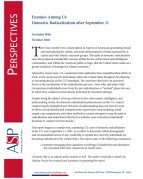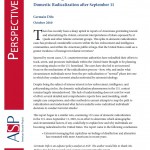
Homegrown Terrorist Threat A Serious Challenge, According To New Report
 American Security Project releases telling report on the growing threat of domestic radicalization cases in the U.S.
American Security Project releases telling report on the growing threat of domestic radicalization cases in the U.S.
WASHINGTON D.C., 25 October 2010 – Today the American Security Project released a new report titled “Enemies Among Us: Domestic Radicalization Cases After September 11,” which analyzes the spike in domestic radicalization cases in the United States.
Germain Difo, author of the report and adjunct policy analyst at the American Security Project (ASP), said: “This report is an important addition to the terrorism debate in the United States, and it sets out to address the threat of domestic radicalization through a strategic framework.”
Difo added: “There is no clear, identifiable demographic profile by which to determine who is most vulnerable to extremist ideology. What we do know is that extremist messaging that capitalizes on feelings of disaffection and alienation is indeed resonating with a small but potentially growing number of Americans.”
Domestic radicalization, more commonly referred to as home grown terrorism, is “immensely complex,” according to the ASP report, which analyzed 132 cases of domestic radicalization since September 11. The report also notes that U.S. policy makers should resist over-reliance on tactical approaches to tackling the issue, and instead focus on developing long term strategies that address the perceptions of exclusion and alienation on which extremism feeds.
Dr. James Ludes, Executive Director of ASP, said: “The forces driving domestic radicalization remain difficult to define, as our report concludes. Individuals arrested for and convicted in the cases analyzed within the report do not fall into any pattern by way of age, national origin, economic class, or favored style of clothing.”
Ludes went on to say: “The common ingredient for radical movements has been the perception of ‘otherness.’ Perceived exclusion by mainstream society often leads to rejection of America itself, and, ultimately, violence. We can’t ignore the threat of domestic radicalization. We hope that our policy makers will take careful note of the prescriptions set forth in our report, which offer strategic recommendations on how to address such a critical challenge. ”
Read the complete “Enemies Among Us” report here.






As a long-time student of domestic terrorism and author of “Patriot’s Blood,” a thriller that uses the Oklahoma City bombing as backdrop to the story, I agree we cannot readily identify those susceptible to radical marginalization. But we often overlook those who exploit those extremist leanings in others––the Fort Hood army psychiatrist being Exhibit One.